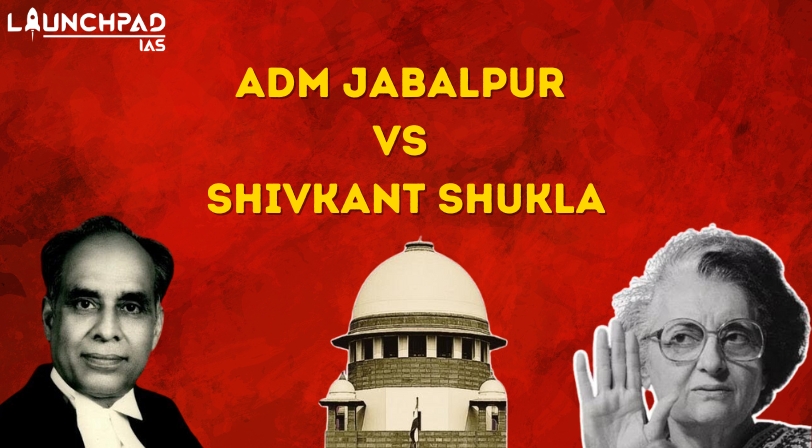About
- The Constitution of India since its adoption in 1950 has provided the citizens with a means to enforce their guaranteed rights through various institutions, especially, the Supreme Court. The Supreme Court has by and large remained firm in its role as the guardian of the fundamental rights that are provided in the Constitution.
- The most serious challenge to the independence and integrity of the Judiciary in general, and the Supreme Court in particular, came when the Late Prime Minister Smt.Indira Gandhi decided to impose an ‘Emergency’ through a proclamation by the then President Fakhruddin Ali Ahmad under Clause (1) of Article 352 of the Constitution. The government declared that a grave emergency existed whereby the security of India was threatened by internal disturbances.
Background
The imposition of emergency was not a sudden decision.
- It all started when Smt. Indira Gandhi’s election to the Lok Sabha was challenged before the Allahabad High Court.
- Justice Sinha convicted her of indulging in wrong practices and declared her election void, which in turn meant she was barred from contesting any election or holding her office for the following six years.
- Gandhi appealed to the apex court but was only granted a conditional stay.
- Therefore, to reclaim the power that was restrained by the aforesaid judgments, she decided to invoke the Constitution and impose an emergency on 26th June 1975.
- On the very next day, the power under Article 359(1) was invoked and the right to approach the Supreme Court to enforce Article14 (Right of equality), Article 21 (Right to life and personal liberty), and Article 22 (Protection against detention in certain cases) was taken away.
- As soon as the above-mentioned provisions of the Constitution were invoked, the process of taking into custody persons who were considered either political opponents or critics started.
- These persons, including A.B. Vajpayee, Jay Prakash Narayan, and Morarji Desai, were arrested under the draconian Maintenance of Internal Security Act (MISA) which provided for custody without any trial.
- Many people arrested under MISA approached various High Courts to challenge their detention and some of them even got favourable orders.
- The government became concerned with these High Court orders and approached the Supreme Court in the case of ADM Jabalpur v Shivkant Shukla.
Judgement in the Habeas Corpus Case
The judgement in this case was delivered by a 5-judge bench comprising Justices Ray, Beg, Chandrachud, Bhagwati, and Khanna.
- The majority ruling was delivered by four judges, while Justice Khanna provided a potent dissenting opinion.
- The Court ruled – Given the Presidential order dated 27 June 1975, no person has any locus standi to move any writ petition under Article 226 before a High Court for habeas corpus or any other writ or order or direction to challenge the legality of an order of detention on the ground that the order is not under or in compliance with the Act or is illegal or is vitiated by mala-fides factual or legal or is based on extraneous consideration.
- The Court also upheld the constitutional validity of Section 16A (9) of MISA.
- Justice H.R. Khanna in his dissent stated that invoking Article 359(1) does not take away the right of an individual to approach the Court for the implementation of statutory rights.
- He added that Article 21 is not the sole repository of life and personal liberty.
- He further stated that during the proclamation of emergency, Article 21 only loses the procedural power but the substantive power of this article is very fundamental and the State does not have the power to deprive any person of life and liberty without the authority of law.
- There was so much political pressure during that particular hearing that this dissent cost Justice Khanna his chance of becoming the Chief Justice as he was the second in line to the Chair of CJI at that time.
- Even Justice Bhagwati expressed his regret later for siding with the majority by saying that he was wrong not to uphold the cause of individual liberty.
Conclusion
- The judgment in the Habeas Corpus case has been widely criticized for favoring the State instead of standing up for individual liberty. HM Seervai termed the judgement so bizarre that if Justice Khanna was arrested for giving the dissent he would not have had any remedy to secure his liberty. Immediately after the emergency ended, the Supreme Court changed its stance by giving Article 21 a permanent character in addition to linking the rights provided in Article 21 with the rights provided in Articles 14 and 19.
- The majority judgement, in this case, is guilty of aiding and abetting the lust for power that the State apparatus at that time displayed. Commenting on the majority ruling in this case, Justice Venkatachaliah in his Khanna Memorial lecture of 2005 stated that the majority decision in the Emergency case should be “confined to the dustbin of history” and it is very hard to argue with his assessment.


